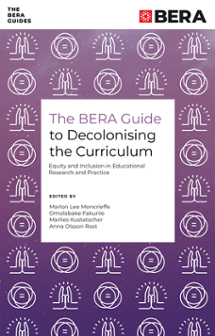
Index
ISBN: 978-1-83549-147-8, eISBN: 978-1-83549-144-7
Publication date: 4 November 2024
Citation
(2024), "Index", Moncrieffe, M.L., Fakunle, O., Kustatscher, M. and Rost, A.O. (Ed.) The BERA Guide to Decolonising the Curriculum: Equity and Inclusion in Educational Research and Practice (The BERA Guides), Emerald Publishing Limited, Leeds, pp. 235-244. https://doi.org/10.1108/978-1-83549-144-720241022
Publisher
:Emerald Publishing Limited
Copyright © 2025 Marlon Lee Moncrieffe, Omolabake Fakunle, Marlies Kustatscher and Anna Olsson Rost
INDEX
- Prelims
- INTRODUCTION
- Chapter 1. Decolonising the Curriculum: Fostering Praxis for Equity and Inclusion
- EARLY CHILDHOOD AND PRIMARY EDUCATION – INTRODUCTION
- Chapter 2. Decolonising and Diversifying Primary School Curriculum Knowledge: Enacting Theory in Practice and Pedagogy
- Chapter 3. The Primary Curriculum for Religious Education in Northern Ireland: Making a Case for Epistemic Justice
- Chapter 4. Decolonising Early Childhood Education: Disrupting Professional Discourses
- Chapter 5. Decolonial Education Through Solidarities: Anti-racism Learning in Early Childhood Education and Care in Canada
- Chapter 6. Decolonising Knowledge of the Parent–Practitioner Relationship in Early Childhood Practice Through Reflective Intercultural Teaching and Learning Interventions
- Chapter 7. Decolonising the Curriculum: A Comparative Case-study of Black Learner and Educator Perspectives and Experience from London (UK) and Johannesburg (South Africa)
- EARLY CHILDHOOD AND PRIMARY EDUCATION – SUMMARY
- SECONDARY AND TERTIARY EDUCATION – INTRODUCTION
- Chapter 8. Diversifying the History Curriculum in England: A Slow (R)evolution
- Chapter 9. Challenging Dominant Narratives: Centring Historically Underserved Voices to Create New Enquiries for the History Classroom
- Chapter 10. A Professional Development Model for the Teaching of British Empire, Migration, and Belonging
- Chapter 11. Decolonisation in Further Education: Engaging Diverse Students in the Delivery of a Decolonised Curriculum for A Level Biology in the Heart of the Former Empire
- Chapter 12. Decolonising Language Teaching: More Than a Box-ticking Exercise
- Chapter 13. HEADSUP: Using Deliberate Reflexive Practice to Strengthen Decolonial Thinking and Action
- SECONDARY AND TERTIARY EDUCATION – SUMMARY
- HIGHER EDUCATION – INTRODUCTION
- Chapter 14. Creating the Anti-racism Framework to Transform the Curriculum for Student Teachers in England
- Chapter 15. Decolonial Praxis in Wales: Reflections on Research, Policy, and Anti-racist Action
- Chapter 16. Decolonising the Curriculum in Higher Education: Introducing a Practice-informed Framework from Two Non-white Academics in a UK University
- Chapter 17. Relationality, Plurilingualism, and Place: Language Education in Higher Education in Northern Ireland
- Chapter 18. ‘Hunting’ for a Black Feminist Decolonial ‘Archive’ at a Predominantly White University
- Chapter 19. Decolonising Teaching and Research: A Student Buddying Programme Between Burundi and the UK
- HIGHER EDUCATION – SUMMARY
- CONCLUSION
- Chapter 20. What Are the Next Steps to Advancing Equity and Inclusion in Teaching and Learning Through Decolonial Educational Research and Practice?
- Glossary of Key Terms
- Index